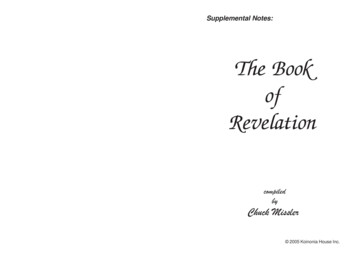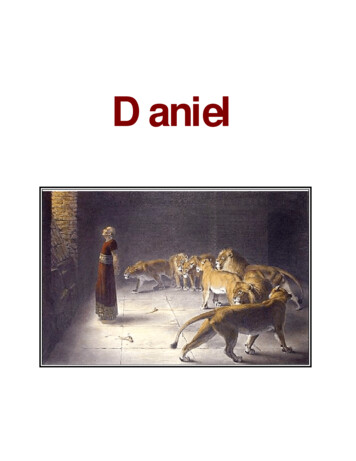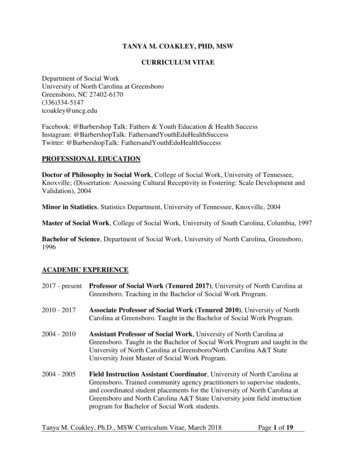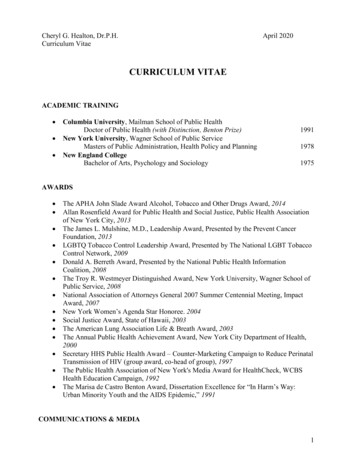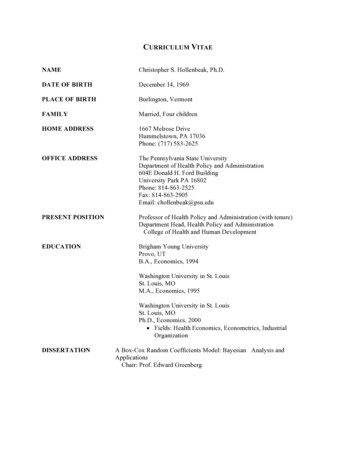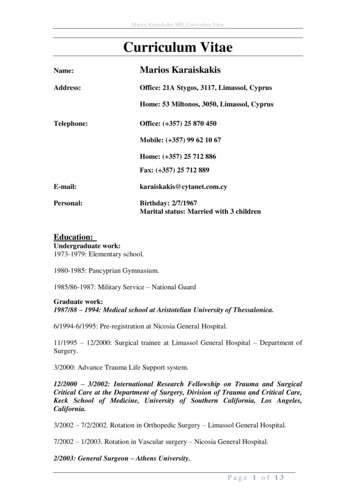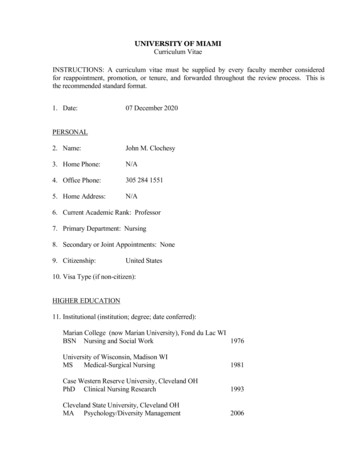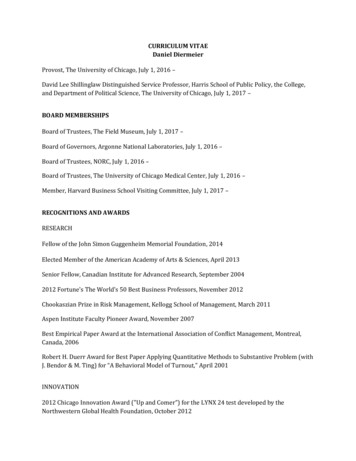
Transcription
CURRICULUM VITAEDaniel DiermeierProvost, The University of Chicago, July 1, 2016 –David Lee Shillinglaw Distinguished Service Professor, Harris School of Public Policy, the College,and Department of Political Science, The University of Chicago, July 1, 2017 –BOARD MEMBERSHIPSBoard of Trustees, The Field Museum, July 1, 2017 –Board of Governors, Argonne National Laboratories, July 1, 2016 –Board of Trustees, NORC, July 1, 2016 –Board of Trustees, The University of Chicago Medical Center, July 1, 2016 –Member, Harvard Business School Visiting Committee, July 1, 2017 –RECOGNITIONS AND AWARDSRESEARCHFellow of the John Simon Guggenheim Memorial Foundation, 2014Elected Member of the American Academy of Arts & Sciences, April 2013Senior Fellow, Canadian Institute for Advanced Research, September 20042012 Fortune's The World's 50 Best Business Professors, November 2012Chookaszian Prize in Risk Management, Kellogg School of Management, March 2011Aspen Institute Faculty Pioneer Award, November 2007Best Empirical Paper Award at the International Association of Conflict Management, Montreal,Canada, 2006Robert H. Duerr Award for Best Paper Applying Quantitative Methods to Substantive Problem (withJ. Bendor & M. Ting) for “A Behavioral Model of Turnout,” April 2001INNOVATION2012 Chicago Innovation Award ("Up and Comer”) for the LYNX 24 test developed by theNorthwestern Global Health Foundation, October 2012
TEACHINGKellogg Alumni Professor of the Year Award, 2013L.G. Lavengood Professor of the Year Award, Kellogg School of Management, NorthwesternUniversity, 2001Professor of the Year, Kellogg-Schulich Executive MBA Program, Schulich School of Business,Toronto, 2010, 2011Best Teacher Award – Kellogg-WHU Executive MBA Program, 2000Sidney J. Levy Teaching Award, Kellogg School of Management, Northwestern University, 1999,2003, 2006, 2010, 2012Faculty Impact Award, Kellogg Student Association, 2009, 2011Unsung Hero Award for an Outstanding Contribution to Students, Graduate ManagementAssociation, Kellogg Graduate School of Management, Northwestern University, June 1998OTHERPre-Dissertation Visiting Fellowship, Northwestern University, October 1993-June 1994Annual Department Graduate Teaching Award, University of Rochester, August 1993Quadrille Ball Fellowship, Institute of International Education, New York, September 1992Rush-Rhees Fellowship, University of Rochester, September 1991Award for Outstanding Academic Achievement, University of Southern California, May 1989Konrad-Adenauer Foundation United States Fellowship, September 1988Konrad-Adenauer Foundation Fellowship for Outstanding Students, May 1986-May 1990PRIOR ACADEMIC POSITIONSDean, Harris School of Public Policy, The University of Chicago, September 1, 2014 - June 31, 2016Emmett Dedmon Professor, Harris School of Public Policy and the College, The University ofChicago, September 1, 2014 – June 30 2016IBM Distinguished Professor of Regulation and Competitive Practices and Professor of ManagerialEconomics and Decision Sciences, Department of Managerial Economics and Decision Sciences,Kellogg School of Management, 2000-2014
Professor of Law (by courtesy), Northwestern School of Law; Professor of Political Science (bycourtesy), Professor of Economics (by courtesy) and Affiliated Faculty, Department of Linguistics,Weinberg College of Arts and Science; Northwestern University, 2011-2014Chairman and Co-Founder, Northwestern Global Health Foundation, 2010-14Director, Ford Motor Company Center for Global Citizenship, Kellogg School of Management, 20062014Director, Kellogg Public-Private Initiative (KPPI), Kellogg School of Management, 2013-2014Co-Director and Co-Founder, Northwestern Institute on Complex Systems (NICO), 2004-2007;Research Faculty and Member of Executive Committee, 2007-2014Founding Director, Social Enterprise at Kellogg program (SEEK), 2005-2006Member, Institute for Public Health and Medicine, Feinberg School of Medicine, NorthwesternUniversity, 2012-2014Faculty Associate, Institute for Policy Research, Northwestern University, 2007-2014Faculty Associate, The Buffett Center for International and Comparative Studies, NorthwesternUniversity, 2006-2014Founding Director, Center for Business, Government, and Society, Kellogg School of Management,2003-2006 (Center merged with Ford Motor Company Center for Global Citizenship in September2006)Acting Director, Ford Motor Company Center for Global Citizenship, Kellogg School of Management,2001-2002Professor of Managerial Economics and Decision Sciences, Kellogg School of Management, andProfessor of Political Science (by courtesy), Department of Political Science, NorthwesternUniversity, 1999Associate Professor of Managerial Economics and Decision Sciences, Kellogg School of Management,Associate Professor of Political Science (by courtesy), Department of Political Science,Northwestern University, July 1997-August 1999Assistant Professor of Political Economy, Graduate School of Business, and Assistant Professor ofPolitical Science (by courtesy), Department of Political Science, Stanford University, September1994-June 1997VISITING POSITIONSVisiting Scholar, Irving B. Harris Graduate School of Public Policy Studies, The University of Chicago,March 2003-June 2003
Visiting Scholar, Department of Economics, London School of Economics, April 1997-June 1997Visiting Researcher, ISCORE, Department of Sociology, Utrecht University, Utrecht, the Netherlands,August 1994 and January-March 1995Pre-Dissertation Visiting Fellowship, Department of Political Science and CMSEMS, NorthwesternUniversity, September 1993-May 1994EDUCATIONAL BACKGROUNDPh.D., Political Science, University of Rochester, May 1995Ph.D. Candidate, Philosophy, Duisburg University, GermanyM.A., Political Science, University of Rochester, May 1993M.A., Political Science, University of Munich, Germany, June 1990A.M., Philosophy, University of Southern California, May 1989FIELDS OF RESEARCH INTERESTGame-Theoretic Models of PoliticsComparative PoliticalInstitutions Legislative PoliticsLanguage and PoliticsBehavioral Models of PoliticsExperimental Game TheoryCollective Choice in Online EnvironmentsStructural Estimation in PoliticsCrisis ManagementReputation ManagementNon-Market StrategyActivists and NGOsBusiness and PoliticsPhilosophy of Social SciencesPUBLICATIONS - BOOKS1. Abito, J.M, Besanko, D, and Diermeier, D. (2019). Corporate Social Responsibility, Reputationand Private Politics: The Strategic Interaction between Activists and Firms. New York, NY:Oxford University Press.
2. Lyon, T.P., Diermeier, D. and Dowell, G., (Eds.) (2014) Corporate Sustainability. (4Volumes). London, England: SAGE.3. Diermeier, D. (2011). Reputation Rules: Strategies for Building Your Company's MostValuable Asset. New York, NY: McGraw Hill.a. Simplified Chinese translation published in People's Republic of China, Spring 2013b. Audio book version - Audible.com, March 2013c. BusinessWeek- Business Summer 2012 Reading Listd. Traditional Chinese translation published by McGraw-Hill Education Taiwan, May2012e. Special Indian edition published by McGraw-Hill Education with Tata Publishing.May 2012f. Japanese translation published by Hankyu. Tokyo, March 2012g. Winner of the 2011 Chookaszian Prize in Risk Managementh. 800 CEO Read - Best Business Book of 2011 Nominee4. Bendor, J., Diermeier, D., Siegel, D. A., Ting, M. M. (2011). A Behavioral Theory of Elections.Princeton, NJ: Princeton University Press.a. Finalist - William H. Riker Award for best book published in 2011 in politicaleconomyPUBLICATIONS - ARTICLES1. Diermeier, D., Prato, C. & Vlaicu, R. (Forthcoming). Self-Enforcing Partisan Procedures.Journal of Politics.2. Maroulis, S., Diermeier D., & Nisar, M. A. (Forthcoming). Discovery, Dissemination, andInformation Diversity in Networked Groups. Social Networks.3. Andonie C. & Diermeier D. Impressionable Voters. (2019). American Economic Journal:Microeconomics 11(1):1-27.4. Rai, T. & D. Diermeier. (2018). Strategic Consequences of being unsympathetic: For-profitcompanies benefit more than individuals from focusing on responsibility. Psychology &Marketing. https://doi.org/10.1002/mar.21165.5. Saghafian, S., W.J. Hopp, S.M.R. Iravani, Y. Cheng, and D. Diermeier. (2018). WorkloadManagement in Telemedical Physician Triage and Other Knowledge-Based Service Systems.Management Science. https://doi.org/10.1287/mnsc.2017.29056. Diermeier, D., Egorov, G., and Sonin, K. (2017). Political Economy of Redistribution.Econometrica. 85(3):851-70.
7. Andonie C. & Diermeier D. (2017). Path-Dependency and Coordination in Multi-CandidateElections with Behavioral Voters. Journal of Theoretical Politics. 29(4):520 – 545.8. Diermeier, D., & Li, C. (2017). Electoral Control with Behavioral Voters. Journal of Politics.79(3):809-902.9. Sagi, E., & Diermeier, D. (2017). Language Use as a Measure of Trust in MultipartyNegotiations. Cognitive Science. 41:259 271.10. Diermeier, D., Prato, C. & Vlaicu, R. (2016). A Bargaining Model of Endogenous Procedures.Social Choice and Welfare. 47(4): 985-1012.11. Soderstrom, S.B.; Uzzi, B.; Rucker, D.; Fowler, J. & Diermeier, D. (2016). Timing Matters:How Social Influence Affects Adoption Pre- and Post-Product Release. Sociological Science 3:915-939.12. Tierney, W; Schweinsberg, M; Jordan, J; Kennedy, D; Qureshi, I; Sommers, S.A., Thornley, N;Madan, N; Vianello, M; Awtrey, E; Lei Zhu, L; Diermeier, D.; Heinze, J; Srinivasan, M;Tannenbaum, D; Bivolaru, E; Dana, J; Davis-Stober, C; du Plessis, C; Gronau, Q; Hafenbrack,Yi Liao, E; Ly, A; Marsman, M; Murase, T; Schaerer, M; Tworek, C; Wagenmakers, E; Wong, L;Anderson, T; Christopher W. Bauman, C; Bedwell, W; Brescoll, V; Canavan, A; Chandler, J;Cheries, E; Cheryan, S; Cheung, F; Cimpian, A; Clark, M; Cordon, D; Cushman, F; Ditto, P;Amell, A; Frick, S; Gamez Djokic, M; Grady, R; Graham, J; Gu, J; Hahn, A; Hanson, B; Hartwich,N; Hein, K; Inbar, Y; Jiang, L; Kellogg, T; Legate, N; Luoma, T; Maibeucher, H; Meindl, P; Miles,J; Mislin, A; Molden, D; Moty, M; Newman, G; Ngo, H; Packham, H; Ramsay, P.S.; Ray, J;Sackett, A; Selliers, A; Sokolova, T; Sowden, W; Storage, D; Sun, X; Van Bavel, J; Washburn, A;Wei, C; Wetter, E; Wilson, C; Darroux, S; & Uhlmann, E. (Forthcoming). Data Descriptor: Datafrom a pre-publication independent replication initiative examining ten moral judgementeffects. (2016). Nature: Scientific Data DOI:10.1038/sdata.2016.8213. Bendor, J., Diermeier, D. and Ting, M. M. (2016). Inequality, Aspirations, and SocialComparisons Political Science Research and Methods 4(3): 451-476.14. Schweinsberg, M., Madan, N., Vianello, M., Sommer, S. A., Jordan, J., Tierney, W., Awtrey, E.,Zhu, L., Diermeier, D., Heinze, J., Srinivasan, M., Tannenbaum, D., Bivolaru, E., Dana, J.,Davis-Stober, C. P., Du Plessis, C. Gronau, Q. F., Hafenbrack, A. C., Liao, E. Y., Ly, A., Marsman,M., Murase, T., Qureshi, I., Schaerer, M., Thornley, N., Tworek, C. M., Wagenmakers, E-J.,Wong, L., Anderson, T., Bauman, C. W., Bedwell, W. L., Brescoll, V., Canavan, A., Chandler, J. J.,Cheries, E., Cheryan, S., Cheung, F., Cimpian, A., Clark, M., Cordon, D., Cushman, F., Ditto, P. H.,Donahue, T., Frick, S. E., Gamez-Djokic, M., Hofstein Grady, R., Graham, J., Gu, J., Hahn, A.,Hanson, B. E., Hartwich, N. J., Hein, K., Inbar, Y., Jiang, L., Kellogg, T., Kennedy, D. M., Legate,N., Luoma, T. P., Maibeucher, H., Meindl, P., Miles, J., Mislin, A., Molden, D. C., Motyl, M.,Newman, G., Ngo, H. H., Packham, H., Ramsay, P. S., Ray, J. L., Sackett, A. M., Sellier, A-L.,
Sokolova, T., Sowden, W., Storage, D., Sun, X., Van Bavel, J. J., Washburn, A. N., Wei, C., Wetter,E., Wilson, C., Darroux, S-C., & Uhlmann, E. L. (2016). The Pipeline Project: Pre-PublicationIndependent Replications of a Single Laboratory's Research Pipeline. Journal ofExperimental Social Psychology 66: 55-67.15. Abito, J., Besanko, D., & Diermeier, D. (2016). Corporate Reputational Dynamics, PrivateRegulation, and Activist Pressure. Advances in Strategic Management. 34: 235 – 299.16. Diermeier, D. (2016). Reputational Dynamics. In Carroll, C.E. (Ed.) The SAGE Encyclopediaof Corporate Reputation. Thousand Oaks, CA: SAGE17. Uhlmann, E.L., Pizarro, D., & Diermeier, D. (2015). A Person-Centered Approach to MoralJudgment. Perspectives on Psychological Science: 10: 72-81.18. Rai, T., & Diermeier, D. (2015) Corporations are Cyborgs. When Organizations can Thinkbut cannot Feel, they Elicit Anger as Perpetrators, but Fail to Elicit Sympathy as Victims.Organizational Behavior and Human Decision Processes 126: 18-26.19. Diermeier, D., Prato, C., & Vlaicu, R. (2014). Procedural Choice in MajoritarianOrganizations. American Journal of Political Science. doi: 10.1111/ajps.12142.20. Diermeier, D. (2014). Anticipation and Management of Reputational Risk in Banking andFinancial Services. Banking Perspective 2-3: 58-64.21. Lyon, T.P., Diermeier, D. & Dowell, G. (2014). Corporate Sustainability. In Lyon, T.P.,Diermeier, D. Dowell, G. (Eds.) Corporate Sustainability. (4 Volumes). London, England:SAGE.22. Heinze, J., Uhlmann, E.L., & Diermeier, D. (2014). Unlikely allies: Credibility transfer duringa corporate crisis. Journal of Applied Social Psychology. DOI: 10.1111/jasp.1222723. Diermeier, D. (2014). Positive political theory. Encyclopedia of Political Thought. Hoboken:Wiley-Blackwell.24. Diermeier, D. (2014). Formal models of legislaturcs. In S. Martin, T. Saalfeld, and K. Strøm(Eds.). The Oxford Handbook of Legislative Studies. Oxford, England: Oxford University Press.25. Blythe, B. & Diermeier, D. (2014). Reputation management. In B. Blythe. Blindsided. AManager's Guide to Crisis Leadership. 2nd Edition. Brookfield, CN; Rothstein.26. Uhlmann, E. L., Zhu, L. & Diermeier, D. (2014). When actions speak volumes: The role ofinferences about moral character in outrage over racial bigotry. European Journal of SocialPsychology 44 (1). 23-29 DOI: 10.1002/ejsp.1987.
27. Austen-Smith, D., Diermeier, D. & E. Zemel (2014). Unintended acceleration: Toyota's recallcrisis. In Anthony, R. Govindarajan, V., Hartmann, F., Kraus, K. & Nilsson, G. (Eds.)Management Control Systems, First European Edition. London, England: McGraw Hill.28. Melo, H.P.M., Franks, A., Moreira, A., Diermeier, D., Andrade Jr., J.S., & Amaral, L.A.N. (2013).A solution to the challenge of optimization on "Golf-Course”- like fitness landscapes. PLoSONE DOI: 10.1371/journal.pone.007840129. Sagi E., Diermeier D., Kaufmann S. (2013). Identifying issue frames in text. PLoS ONE, 8(7),469185. doi:10.1371/journal.pone.0069185.30. Kim, H.D., Castellanos, M., Hsu, M., Zhai, C. X. Reitz, T. & Diermeier, D. (2013). Mining causaltopics in text data: Iterative topic modeling with time series feedback. Proceedings of the22nd Association for Computing Machinery (ACM) International Conference on Informationand Knowledge Management (CIKM 2013).31. Sales-Pardo, M., Diermeier, D., & Amaral, L.A.N. (2013). The impact of individual biases onconsensus formation. PLOS ONE 8(5): e58989. doi:10.1371/journal.pone.005898932. Sagi E., & Diermeier D. (2013). The time course of language use in multiparty negotiations.In M. Knauff, M. Pauen, & I. Wachsmuth (Eds.), Proceedings of the 35th Annual Meeting of theCognitive Science Society (CogSci2013 – pp.3343-3347). Austin: Cognitive Science Society.33. Diermeier, D. & Fong, P. (2012). Non-cooperative characterizations of the Von NeumannMorgenstern stable sets in dynamic policy-making with a persistent agenda setter. Gamesand Economic Behavior 76(1):349-353.34. Kim, H.D., Zhai, C., Rietz, T., Diermeier, D., Hsu, M., & Castellanos, M. (2012). InCaToMi:Integrative causal topic miner between textual and non-textual time series data.Proceedings of 21st Association for Computing Machinery (ACM) International Conference onInformation and Knowledge Management (CIKM 2012).35. Jordan, J., Diermeier, D., & Galinsky, A. G. (2012). The strategic samaritan: Howeffectiveness and proximity affect corporate responses to external crises. Business EthicsQuarterly 22(4):621-648 [Lead Article).36. Tannenbaum D., Uhlmann, E.L., & Diermeier, D. (2012). Moral signals, public outrage, andimmaterial harms. Journal of Experimental Social Psychology 47:1249-1254.37. Baron, D., Diermeier, D., & Fong, P. (2012). A dynamic theory of parliamentary democracy.Economic Theory 49(1):703-738.
38. Swaab, R.I., Diermeier, D., Galinsky, A. & Medvec, V. (2012). The communicationorientation model: Explaining the diverse effects of sight, sound, and synchronicity onnegotiation and group decision making outcomes. Personality and Social Psychology Review16(1): 25-53.39. Diermeier, D., Yu, B., Kaufmann, S., & Godbout, J.F. (2012). Language and ideology inCongress. British Journal of Political Science 42(1):31-55.40. Diermeier, D. (2011). The need for reputation management capabilities. European BusinessReview (p.46-50).41. Diermeier, D., & Fong, P. (2011). Legislative bargaining with reconsideration. QuarterlyJournal of Economics 126(2):895-946.42. Diermeier, D., & Vlaicu, R. (2011). Legislative success. Review of Economic Studies 78(3):846-871.43. Diermeier, D., & Vlaicu, R. (2011). Parties, coalitions, and the internal organization oflegislatures. American Political Science Review 105: 359-380.44. Diermeier, D., & Fong, P. (2011). Bargaining over the budget. Social Choice and Welfare 36(3-4): 565-589.45. Diermeier, D., Huffaker, D., & Swaab, R.I. (2011). The language of coalition formation inonline multiparty negotiations. Journal of Language and Social Psychology 30(1):66-81.46. Diermeier, D. (2011). Coalition Experiments. In J. N. Druckman, D. P. Green, J. H. Kuklinski,and A. Lupia (Eds.) Handbook of Experimental Political Science (399-412). New York:Cambridge University Press.a. Winner of Robert E. Lane Award Co-Winner for the best book published in politicalpsychology published in 2011. Awarded by the Political Psychology Section of theAmerican Political Science Associationb. Best Book Award for best book published in 2011 that either uses or is aboutexperimental research methods in the study of politics. Awarded by theExperimental Research Section of the American Political Science Association47. Diermeier, D. (2011). The Cost of Reputation: The Impact of Events on a Company'sFinancial Performance. In A. Hiles (Ed.) Reputation Management, Building and Protectingyour Company's Profile in a Digital World (153-162). London: Bloomsbury Publishing.48. Diermeier, D. (2011). Public Acceptance and the Regulation of Emerging Technologies –The Role of Private Politics. In D. Dana (Ed.). The Nanotechnology Challenge (63-83).Cambridge, UK: Cambridge University Press.
49. Palamountain, K.M., Stewart, K.A., Diermeier, D., Krauss, A., & Kelso, D. (2010). Universityleadership for innovation in global health and HIV/AIDS diagnostics. Global Public Health 5(2): 189-196.50. Beigman Klebanov, B., Beigman, E., & Diermeier, D. (2010). Vocabulary choice as anindicator of perspective. Proceedings of the 48th Annual Meeting of the Association forComputational Linguistics: 253-258.51. Swaab, R.I., Diermeier, D., Kern, M., & Medvec, V. (2009). Who says what to whom? Effectsof communicator and content awareness on coalition formation. Social Cognition 27: 381397.52. Beigman Klebanov, B., Beigman, E., & Diermeier, D. (2009). Discourse topics andmetaphors. In Proceedings of the Workshop on Computational Approaches to LinguisticCreativity at the Annual Meeting of the North American Chapter of the Association forComputational Linguistics: 1-8.53. Majumder, S.R., Diermeier, D., Rietz, T. & Amaral, L.A.N. (2009). Price dynamics in politicalprediction markets. Proceedings of the National Academy of Sciences. [Cover Article.] 106(3):679-68454. Seaver, S.M.D., Diermeier, D., Malmgren, R.D., Moreira, A.M., Sales-Pardo, M., & Amaral,L.A.N. (2009). Micro-bias and macro-performance. The European Physical Journal B 67: 367375.55. Beigman-Klebanov, B., Beigman, E., & Diermeier, D. (2008). Lexical cohesion analysis ofpolitical speech. Political Analysis, 16(4): 447-463. Reprinted. (2010) W. Paul Vogt (Ed.)Data Collection. SAGE Benchmarks in Social Research Methods. London, UK: SAGEPublications.56. Diermeier, D., & Van Mieghem, J. (2008). Coordination and turnout in large elections.Mathematical and Computer Modeling, 48, 1478-1496.57. Diermeier, D., & Van Mieghem, J. (2008). Voting with your pocket book: A stochastic modelof consumer boycotts. Mathematical and Computer Modeling, 48, 1497-1509.58. Diermeier, D., Swaab, R.I., Medvec, V., & Kern, M. (2008). The micro-dynamics of coalitionformation. Political Research Quarterly, 61(3), 484-501.59. Yu, B., Diermeier, D., & Kaufmann, S. (2008). Ideology classifiers for political speech.Journal of Information Technology and Politics, 5, 33-48.
60. Beigman-Klebanov, B., Beigman, E., & Diermeier, D. (2008). Automatic annotation ofsemantic fields for political science research. Journal of Information Technology and Politics,5, 95-120.61. Beigman-Klebanov, B., Beigman, E., & Diermeier, D. (2008). Analyzing disagreements.Proceedings of the Coling 2008 Workshop on Human Judgments in Computational Linguistics.Association for Computational Linguistics.62. Yu, B., Diermeier, D., & Kaufmann, S. (2008). Exploring the characteristics of opinionexpressions for political opinion classification. Proceedings of the 9th Annual InternationalConference on Digital Government Research (82-91). Montreal, Canada: Digital GovernmentSociety of North America.63. Swaab, R.I., Diermeier, D., Phillips, K.W., & Medvec, V. (2008). The pros and cons of dyadicconversations in groups: The impact of communication opportunities on group decisions.Small Group Research, 39(3).64. Diermeier, D., & Fong, P. (2008). Policy persistence in multi-party parliamentarydemocracies. In E. Helpman (Ed.), Institutions and economic performance (361-405).Cambridge, MA: Harvard University Press.65. Diermeier, D. (2008). Managing public reputation. In B. Calder (Ed.), Kellogg on advertisingand the media (178-195). Evanston, IL: Northwestern University Press.66. Bendor, J., Diermeier, D., & Ting, M. (2007). Adaptive models in sociology: The problem ofempirical content. American Journal of Sociology, 112, 1534-45.67. Diermeier, D., & Andonie, C. (2007). Spontaneous coordination. Proceedings of the Agent2007 Workshop on Complex Interaction and Social Emergence (329-341). Argonne NationalLaboratory.68. Diermeier, D., Eraslan, H., & Merlo, A. (2007). Bicameralism and government formation.Quarterly Journal of Political Science, 2, 1-26.69. Baron, D., & Diermeier, D. (2007). Strategic activism and non-market strategy. Journal ofEconomics and Management Strategy, 16(3), 599-634.a. Reprinted in Lyon, T.P., Diermeier, D., Dowell, G., Editors (2014) CorporateSustainability. (4 Volumes). London, England: SAGE.70. Diermeier, D. (2007). Private politics: A research agenda. The Political Economist, XIV, 1-2.
71. Diermeier, D. (2007). From corporate social responsibility to values-based management. InA. Dayal-Gulati & M. Finn (Eds.), Global corporate citizenship (1-23). Evanston, IL:Northwestern University Press.72. Diermeier, D. (2007). Arguing for computational power. [Review of J.M. Epstein,Generative social science: Studies in agent-based computational modeling]. Science, 318,918-919.73. Diermeier, D. and S. Gailmard. (2006). Self-interest, inequality, and entitlement inmajoritarian decision-making. Quarterly Journal of Political Science, 1(4), 327-35074. Seaver, S.M.D., Malmgren, R.D., Moreira, A.A., Sales-Pardo, M., Diermeier, D., & Amaral,L.A.N. (2006). Social cognition in complex team networks. Proceedings of the 2005 Workshopon Social Agents. Argonne National Laboratory.75. Diermeier, D., Hopp, W.J., & Iravani, S. (2006). Innovating under pressure: Towards ascience of crisis management. National Bureau of Economic Research's Innovation Policy andthe Economy Series, 7.76. Diermeier, D. (2006). Coalition government. In B. Weingast & D. Wittman (Eds.), Oxfordhandbook of political economy (162-179). Oxford University Press.77. Diermeier, D. (2006). A strategic perspective on corporate social responsibility. In N. Pless& T. Maak (Eds.), Responsible leadership (155-169). Routledge.78. Diermeier, D., Eraslan, H., & Merlo, A. (2006). The effects of constitutions on coalitiongovernments in parliamentary democracies. In R. Congleton & B. Swedenborg (Eds.),Democratic constitutional design and public policy: Analysis and evidence (133-162).Cambridge, MA: MIT Press.79. Diermeier, D., & Morton, R. (2005). Proportionality versus perfectness: Experiments inmajoritarian bargaining. In D. Austen-Smith & J. Duggan (Eds.), Social choice and strategicdecisions: Essays in the honor of Jeffrey S. Banks (201-227). Berlin et al.: Springer.80. Diermeier, D., Keane, M., & Merlo, A. (2005). A political economy model of congressionalcareers, American Economic Review, 95(1), 347-373.81. Amaral, L.A.N., Mathur, A., Moreira, A.A., & Diermeier, D. (2005). Efficient system-widecoordination in modular networks. In D. Sachar & C. Macal (Eds.), Proceedings of the 2004Workshop on Social Agents: Ecology, Exchange, and Evolution. Argonne NationalLaboratory.
82. Moreira, A.A., Mathur, A., Diermeier, D., & Amaral, L.A.N. (2004). Efficient system-widecoordination in noisy environments using heuristic methods. Proceedings of the NationalAcademy of Sciences, 101, 12085-90.83. Diermeier, D. (2004). From minimizing liability to maximizing opportunity: Crisismanagement with application to the natural resources industries. Proceedings of the RockyMountain Mineral Law Foundation Fiftieth Annual Institute, 2, 1-19.84. Diermeier, D., & Merlo, A. (2004). An empirical investigation of coalitional bargainingprocedures. Journal of Public Economics, 88(3-4), 783-797.85. Bendor, J., Diermeier, D., & Ting, M. (2003). A behavioral model of turnout. AmericanPolitical Science Review, 97(2).86. Diermeier, D., & Krehbiel, K. (2003). Institutionalism as a methodology. Journal ofTheoretical Politics, 15(2), 123-144.87. Diermeier, D., Eraslan, H., & Merlo, A. (2003). A structural model of government formation.Econometrica, 71(1), 27-70.88. Bendor, J., Diermeier, D., & Ting, M. (2003). Some methodological issues in models ofreinforcement learning. Proceedings of the 2002 Workshop on Social Agents: Ecology,Exchange, and Evolution. Argonne National Laboratory.89. Bendor, J., Diermeier, D., & Ting, M. (2003). Recovering Behavioralism: Adaptively rationalstrategic behavior with endogenous aspirations. In K. Kollman & S. Page (Eds.),Computational political economy (213-274). Cambridge, MA: MIT Press.90. Diermeier, D., Eraslan, H., & Merlo, A. (2002). Coalition government and comparativeconstitutional design. European Economic Review, 46, 893-907.91. Diermeier, D. (2002). Some conceptual issues in institutionalist theories of politics. In H.P.Burth & T. Pluemper (Eds.), Jahrbuch fuer Handlungs und Entscheidungs Theorie [Yearbookof theory of decision and action (31-56). Leske Budrich.92. Bendor, J., Diermeier, D., & Ting, M. (2001). Aspiration-based adaptation in games.Proceedings of the 2000 Workshop on Simulation of Social Agents: Architecture andInstitutions, 144-162. Argonne National Laboratory.93. Baron, D., & Diermeier, D. (2001). Elections, governments, and parliaments in proportionalrepresentation systems. Quarterly Journal of Economics, 116(3), 933-967.a. Reprinted in T. Dewan, K. Dowding, K. A. Shepsle (Eds). (2009) Rational ChoicePolitics, 283-312. Thousand Oaks, California: Sage Publications.
94. Diermeier, D., & Stevenson, R. (2000). Cabinet terminations and critical events. AmericanPolitical Science Review, 94(3), 627-640.95. Diermeier, D., & Merlo, A. (2000). Government turnover in parliamentary democracies.Journal of Economic Theory, 94, 46-79.96. Diermeier, D., & Feddersen, T.J. (2000). Information and congressional hearings. AmericanJournal of Political Science, 44(1), 51-65.97. Diermeier, D., & Myerson, R.B. (1999). Bicameralism and its consequences for the internalorganization of legislatures. American Economic Review, 89(5), 1182-1196.a. Reprinted in T. Dewan, K. Dowding, K. A. Shepsle (Eds). (2009) Rational ChoicePolitics, 163-184. Thousand Oaks, California: Sage Publications.98. Diermeier, D., & Stevenson, R. (1999). Cabinct survival and competing risks. AmericanJournal of Political Science, 43(5), 1051-1098.99. Diermeier, D., & Feddersen, T.J. (1998). Cohesion in legislatures and the Vote of Confidenceprocedure. American Political Science Review, 92(3), 611-621.a. Reprinted in T. Dewan, K. Dowding, K. A. Shepsle (Eds). (2009). Rational ChoicePolitics (324-333). Thousand Oaks, California: Sage Publications.100. Diermeier, D., & Feddersen, T.J. (1998). Comparing constitutions: Cohesion anddistribution in legislatures. European Economic Review, 42(3-5), 665-672.101. Diermeier, D., & van Roozendaal, P. (1998). The duration of cabinet formation processes inWestern multi-party democracies. British Journal of Political Science, 28, 609-626.102. Diermeier, D., Ericson, J., Frye, T., & Lewis, S. (1997). Credibility and commitment: The caseof property rights. In D. Weimer (Ed.), The political economy of property rights (20-42).Cambridge (UK) University Press.103. Diermeier, D. (1997). [Review of J.H. Aldrich, Why parties?' (in German) 1. PolitischeVierteljahresschrift, 4, 886-888.104. Diermeier, D. (1996). Spieltheoretische Modelle in der Theorie der Politik (Game theoreticmodels in the theory of politics) (in German). In U. Druwe & V. Kunz (Eds.), Handlungs- undEntscheidungstheorie in der Politikwissenschaft: Eine Einfuehrung in Konzepte undForschungsstand (207-226). Leske Budrich.105. Diermeier, D. (1995). Commitment, deference, and legislative institutions. AmericanPolitical Science Review, 89(2), 344-355.
106. Diermeier, D. (1995). Rational choice and the role of theory in political science. CriticalReview, 9(1-2), 59-70.a. Reprinted in J. Friedman (Ed.),
Northwestern Global Health Foundation, October 2012 . TEACHING Kellogg Alumni Professor of the Year Award, 2013 L.G. Lavengood Professor of the Year Award, Kellogg School of Management, Northwestern University, 2001 Professor of the Year, Kellogg-Schulich Executive MBA Program, Schulich School of Business, Toronto, 2010, 2011
